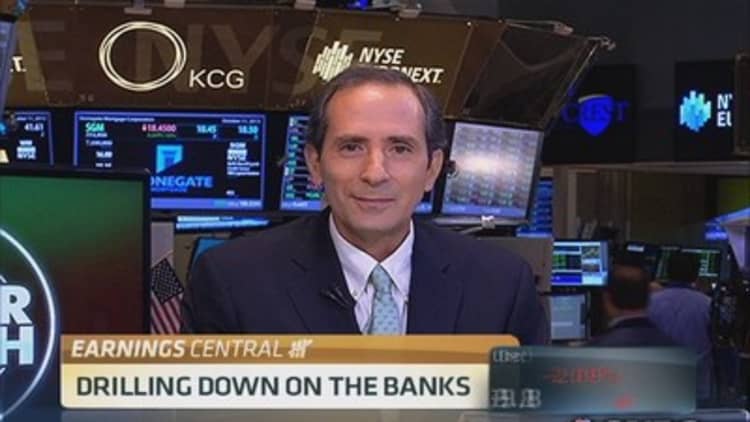Virtual currencies, mobile wallets and Facebook transactions are just some of the innovations being introduced by retail banks concerned about being left behind by trends in social networking and mobile computing, according to a survey of the industry.
Some banks have already attempted to embrace social media, with one bank offering a higher saving rate depending on how many Facebook "likes it gets" and another using motion capture and virtual reality to draw in passersby.
(Read More: Google shares hit new high after earnings beat)
In a survey of 148 retail banks in 66 countries, including high profile lenders such as Wells Fargo and Barclays, 60 percent said they had an innovation strategy compared to just 37 percent five years ago. The research, commissioned by consulting firm Infosys and conducted by banking association Efma, also showed that 76 percent of retail banks said they thought they were becoming more innovative and 35 percent are planning to invest in new areas.
"In the face of growing competition from new entrants, and rapidly changing consumer and technology trends, banks will have to improve their innovation capabilities in order to protect their markets and profitability, and to prosper in the long run," the report, released on Monday, said.
Rajashekhara Maiya, assistant vice president of Infosys' software product, Finacle, told CNBC that banks were also looking enviously at innovations like online credit systems used in Facebook game Farmville, online currencies like bitcoin and peer-to-peer lending like Zoopa.
(Read More: What Is Bitcoin?)
"Customers' expectations are changing," he said. "They now want a social media experience in banking."
But if most banks have now realized that they need to increase social and mobile presence, some have already started. Of the banks surveyed, some 29 percent said they already have already deployed mobile peer-to-peer payments, an online technology that allows customers to transfer funds from their bank account or credit card to another individual's account via the Internet or a mobile phone.
Also, 23 percent of the banks said that they have already deployed direct only banking, which can offer services remotely via online banking without any physical branches.
(Read More: The hidden challenge facing banks)
The research also details some of the more extravagant examples of innovation. Grow Financial, a credit union in the United States, installed a giant video screen outside a branch which allows passers-by to play a game and win money using interactive graphics on their mobile phones and a mirror that captures motion.
Germany's Fidor Bank used Facebook to tempt users into helping with its online promotion. The more Facebook likes it receives, the more interest users would have on their savings. The bank has also recently revealed it has teamed up with bitcoin marketplace bitcoin.de, with the online bank agreeing to provide a 'liability umbrella' to the virtual currency exchange, meaning it can prove it is officially following financial market regulations.
Meanwhile, Spanish bank BBVA has set up a $100 million fund is based in Silicon Valley to invest in start-ups which are transforming the financial services industry. The bank has also previously invested in Ribbit Capital – a fund targeting investments in "radical financial services businesses" and has backed three bitcoin firms, including San Francisco-based Coinbase.
(Read More: Bitcoin recognized by Germany as 'private money')

Rocky road ahead?
Of the banks surveyed, traditional retail lenders saw web portal and internet search companies like Google as the most significant threat to the way they do business, the survey found.
Google's incursions into mobile payments might have the banks most concerned. Google Wallet, allows users to store debit cards, credit cards, loyalty cards, and gift cards on their mobile phone. It can be used to send money to people via email, used for online shopping or even simply by tapping the phone on any PayPass-enabled terminal when out shopping.
While Google Wallet still requires a conventional bank account to wire in money, the fear is that consumers then interact with Google and have no need to interact with the bank. Retail banks could be missing out on traffic to its own mobile apps and won't be able to offer consumers other potentially revenue generating products at the same time.
(Read More: How Retail Banks Are Shrinking)
Add should Google launch its own virtual currency – a development that the internet giant has so far denied it is working on -- and banks will have even more to get worried about. Google would then be able to track how successful its advertising is from beginning to end, as well as adding extra information to its growing database of its users.
The road ahead looks rocky for traditional lenders. Michael Pearson, strategic advisor at Efma said that the biggest challenge in the next few years is going to be how they can innovate to create completely new revenue streams, particularly in mature markets.
"Incremental innovation is fine and important, but banks need to be able to be slightly more radical and experimental. Given the general culture of risk aversion and the lack of entrepreneurial skills in most banks, this will not be easy," he said in the report.
— CNBC.com's Matt Clinch. Follow him on Twitter @mattclinch81





